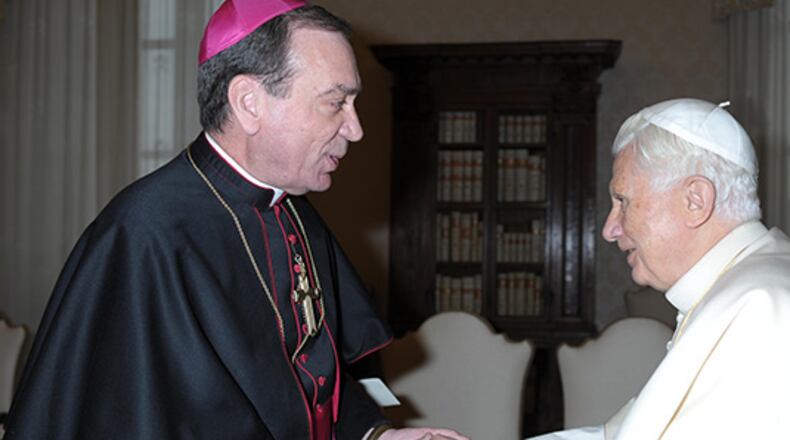“Pope Benedict is widely known as one of the greatest theologians of the 20th century, but this distinction should not overshadow his genuine personal interactions and humble nature,” Schnurr said in a statement on Saturday. “Those of us who interacted with him can attest to his ready sense of humor and consistently kind nature.”
Born Joseph Ratzinger in Bavaria on April 16, 1927, Pope Benedict XVI was elected to the position in April 2005, at age 78, according to the United States Conference of Catholic Bishops. He served actively until Feb. 28, 2013, when he made the historic decision to resign from the papacy, the first such resignation in 600 years.
Schnurr, who served as general secretary of the USCCB in the early 1990s, described early encounters with the future pope, who he recalls as having great humility, during frequent trips to Rome.
“Oftentimes, I would see then-Cardinal Ratzinger making his daily treks across St. Peter’s Square from his apartment to his office,” said Schnurr, noting that he would mingle with passersby, giving no outward indication of his cardinalship.
Schnurr described witnessing, on multiple occasions, Cardinal Ratzinger being asked by groups of tourists to serve as its photographer, a favor he completed “willingly and with a generous smile.”
“As far as the group members were concerned, they had just been assisted by one of the local priests—and Cardinal Ratzinger seemed content to leave them with that understanding,” Schnurr said. “I often wonder today if any of those tourists know their photographer moved on to become Pope Benedict XVI.”
Earlier this week, with news that Pope Benedict XVI had fallen gravely ill, University of Dayton religious studies professor Vince Miller reflected on the theologian’s legacy in a Twitter thread.
With news that #PopeBenedict is seriously ill, Prof. Vince Miller reflects on his legacy 🧵
— University of Dayton News (@UDaytonNews) December 28, 2022
As Pope Benedict XVI, contrary to the fears and hopes of many, he did not act as a conservative reformer (1/)
“Throughout his papacy, he undid the cult of personality that had grown around his predecessor, John Paul II,” Miller wrote. “Although he was less charismatic than his predecessor, Benedict intentionally redirected acclaim away from himself to God.”
Miller described a moment during the first World Youth Day of his papacy, which serves as a testament to his modest deflection of praise.
“In reaction to celebratory acclaim—'Ben-e-det-to!’—Benedict turned away from the adoring assembly in silence to prayerfully face the Eucharist,” he wrote.
In his resignation, Miller continued, Benedict “highlighted the humanity of the papacy.”
“His resignation was perhaps his most radical act of reform. While his predecessor was lauded for his witness of persevering in illness, the Church was left adrift amidst the growing scandals of the clerical sexual abuse crisis,” he wrote. “For all the sacredness of the office, (Benedict) showed it to be a role of responsibility to the church, which should be handed on when it could no longer be fulfilled.”
About the Author

